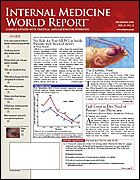Low Testosterone Levels in Older men Increase Risk of Falling
Arch Intern Med
Circulating testosterone levels in men are known to decline with age, but the ramifications of this change remain controversial. Now a new study shows that older men with low serum testosterone levels are at increased risk of falling (. 2006; 166: 2124-2131), a well-established risk for increased morbidity and mortality in the elderly.
Researchers explored the relationship between testosterone concentrations, physical performance, and fall risk in 2587 community-dwelling ambulatory men aged 65 to 99 years. Participants were randomly selected from a larger group recruited for the Osteoporotic Fractures in Men Study, a cohort study of men aged ≥65 years.
Testosterone assays were performed on serum samples obtained at baseline. All participants completed questionnaires at 4-month intervals that included information on the number of times they had fallen during the previous interval.
Increasing age was associated with lower levels of bioavailable testosterone and estradiol, and with reduced lean body mass, strength, and physical performance. Overall, men with higher levels of bioavailable testosterone tended to have a lower body weight, body mass index, and fat mass index.
P
During a mean follow-up of 4 years, 56% of the men reported falling at least once. Falls occurred more often in those who reported at least 1 fall before baseline, as well as in those aged ≥80 years compared with those aged 65 to 69 years ( <.001 for both).
The risk of falling was greater in men who demonstrated less strength or had poorer physical performance at baseline. The risk of falls also increased progressively as baseline bioavailable testosterone levels decreased. Men in the lowest quartile of grip strength or of bioavailable testosterone were at a 40% higher risk of falling than men in the highest quartile.
Lower levels of bioavailable testosterone were also linked to an increased risk of multiple falls. Although lower levels of total testosterone correlated with an increased risk of falling, the association was weaker than with bioavailable testosterone.
The effect of baseline bioavailable testosterone on fall risk was most apparent in those in their 60s and 70s and was not related to bioavailable testosterone levels in men older than 80.
The inverse association between testosterone level and likelihood of falling was not influenced by overall health status or physical performance, Eric Orwall, MD, and colleagues noted.
“These findings strengthen the link between testosterone and the health of older men, suggesting that the effects of testosterone on fall risk might be via novel mechanisms and provide insight into how testosterone measurements might be useful for identifying men at higher risk for adverse events,” they wrote.
